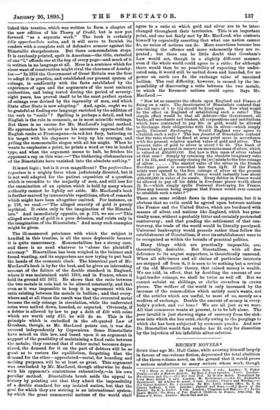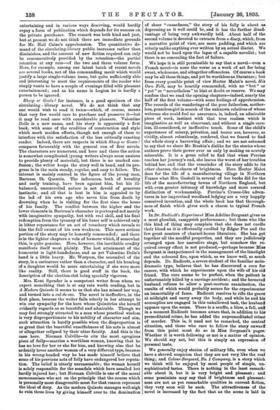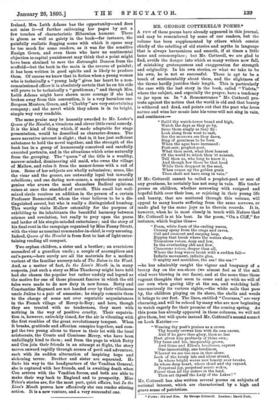RECENT NOVELS.*
SOME time ago Mr. Hall Caine, while avowing himself largely in favour of one-volume fiction, deprecated the total abolition of the three-volume novel, on the ground that it would prove a serious misfortune to many writers whose work, though • (1.) Sheep or Goats? By Valentin,: belle. 3 vols. London: T. Fisher Cowin.—(2) A Modern Quixote. By Mrs. J. Kent Spender. 3 vols. London: Hrs.-chit:son and Co.—(3 ) Her Own Folk. By H. etor Malot. Translated by L tdy Mary Lloyd. 2 Iv's. London : W. Heinemann.—(4.) Dr. Endicott Experiment. By Adeline Se geant. 2 vols. London : Chat.° and Windna.— (5.) Colour-Sergeant, No. 1 Company. By Mrs. Leith Adams (Mrs. R. S. do Conroy Leffan). 2 vole. London Jarrold and Sons.—I6.) Queen of the Hamlet. By H. L. Lester. 2 vols. London : Chapman and Hall.— (7) In the Lion's Mouth the Story of Two English Children in France, 1789-1793. By Eleanor C. Price. London: MIIC1111'11111 and CO
entertaining and in various ways deserving, would hardly repay a form of publication which depends for its success on the private purchaser. The remark was both kind and just, but at present we do not think there are immediate grounds for Mr. Hall Caine's apprehension. The quantitative de- mand of the circulating-library public increases rather than diminishes, and the amount of new fiction required can only be remuneratively provided by the retention—the partial retention at any rate—of the two and three volume form. Here, for example, among our latest batch of recent novels are several books, not of the commanding merit which would justify a large single-volume issue, but quite sufficiently able and interesting to meet the requirements of the reader who simply wants to have a couple of evenings filled with pleasant entertainment ; and as his name is Legion he is hardly a person to be ignored.
Sheep or Goats 1 for instance, is a good specimen of the circulating - library novel. We do not think that any one would wish to read it twice—which, of course, means that very few would care to purchase and preserve it—but it may be read once with considerable pleasure. Valentine Delle is a new name, and his story is apparently a first book, with some of the crudities of construction and style which mark maiden efforts, though not enough of them to interfere with the satisfaction of the less critically exacting reader. Indeed, there are respects in which Sheep or Goats ? compares favourably with the general run of first novels. The characters are numerous, and here and there the action is somewhat complicated (young writers always seem anxious to provide plenty of material), but there is no marked con- fusion; the writer keeps the story well in hand, and its pro- gress is in the main steady, regular, and easy to follow. The interest is mainly centred in the figure of the young man, Bertram St. Quentin. The influences, both of heredity and early training, have been against him, but his ill- balanced, uncontrolled nature is not devoid of generous instincts ; and all that is best in him is appealed to by the lad of his own age who saves him from death by drowning when he is visiting for the first time the home of his family. The conflict between the higher and the lower elements in Bertram's character is portrayed not merely with imaginative sympathy, but with real skill, and his final redemption from the tyranny of his baser self is achieved only in bitter repentance for an act of treachery which reveals to him the full extent of his own weakness. This more serious portion of the story may be honestly commended ; and there is in the lighter chapters a vein of humour which, if somewhat thin, is quite genuine. Here, however, the inevitable crudity manifests itself most plainly. The last attainment of the humourist is light-handedness, and as yet Valentine Delle's hand is a little heavy. Mr. Worpum, the scoundrel of the story, is a caricature rather than a character, and his humbug of a daughter would be more entertaining if she were more like reality. Still, there is good stuff in the book, the description of the election-riot being specially vigorous.
Mrs. Kent Spender is a competent writer from whom we expect something that is at any rate worth reading, but in A Modern Quixote it seems to us that she has missed her way, and turned into a cul, de-sac. The novel is ineffective, in the first place, because the writer fails utterly in her attempt to win our sympathy for the hero whose Qnixotries she herself evidently regards as so beautiful and admirable. Though we may feel strongly attracted to a man whose practical wisdom is very disproportionate to his nobility of character and aim, such attraction is hardly possible when the disproportion is so great that the beautiful unselfishness of his acts is almost or altogether eclipsed by their utter fatuity. And this is the case here. Norman Colville—to cite the most egregious piece of folly—marries a worthless woman, knowing that he has no love for her or she for him, and knowing also that he ardently loves another woman of a very different type, because in his wrong-headed way he has made himself believe that some of his previous acts of folly have endangered her reputa- tion. The belief is utterly unreasonable ; the woman herself is solely responsible for the scandals which have assailed but hardly injured her; but Norman Colville is one of the moral monomaniacs who act on the principle that the course which is personally most disagreeable must for that reason represent the ideal of duty. As the modern Quixote manages well-nigh to rain three lives by giving himself over to the domination of sheer " cussedness," the story of his folly is about as depressing as it well could be, and it has the further disad- vantage of being very awkwardly told. About half of the second volume is devoted to extracts from a diary, which, from a narrative point of view, are mere padding, and which are utterly unlike anything ever written by an actual diarist. We would not be hard upon the lapse of a capable novelist ; but there is no concealing the fact of failure.
We hope it is still permissible to say that a novel—even a French novel—is none the worse as a work of art for being sweet, wholesome, and altogether offenceless. Of course a book may be all these things, and yet be worthless as literature ; but from every possible point of view Hector Malot's novel, His Own Folk, may be heartily commended, with no " but " or " yet " or " nevertheless " to hint at doubt or reserve. We may confess that we read the opening chapters—indeed, nearly the half of the first volume—with some feelings of apprehension. The records of the wanderings of the poor fatherless, mother- less, penniless girl in search of the unknown relatives of whose welcome she could feel no assurance, is, indeed, an admirable piece of work, instinct with that true realism which is imaginative as well as observant, and without a single care- less, ill-considered, or ineffective touch. Some of the child's experiences of misery, privation, and terror are, however, so vividly, almost relentlessly, rendered, that we feared to find the whole story a harrowing affair ; and we are not ashamed to say that we share Mr. Ruskin's dislike for the stories whose authors prove their power over us only by making us acutely miserable. It is a great relief to find that when Perrine reaches her journey's end, she leaves the worst of her troubles behind her, and that the remainder of the story adds to its other charms, the charm of brightness. Here Hector Malot does for the life of a manufacturing village in Northern France what Mrs. Gaskell in several of her books did for the life of the manufacturing towns of Northern England, but with even greater intimacy of knowledge and more assured distinction of workmanship. Perrine's Crusoe-like adven- tures in her improvised woodland lodging are a very happily conceived invention, and the whole book has that thorough- ness of finish which gives such a charm to typical French work.
In Dr. Endicott's Experiment Miss Adeline Sergeant gives us a most ghoulish, vampyrish performance ; but those who like this kind of thing may complain that she does not curdle their blood as it is effectually curdled by Edgar Poe and the few great masters of charnel-house literature. She has got together all the needful properties, and they are judiciously arranged upon her narrative stage, but somehow the re- quired creepy effect is not produced,—perhaps because. Miss Sergeant is inexperienced in the management of the limelight and the coloured fire, upon which, as we know well, so much depends. Dr. Endicott, a severe student of the familiar melo- dramatic type, believes that he has discovered a cure for cancer, with which he experiments upon the wife of his old friend. The cure seems to be perfect, when the patient is unfortunately killed by a carriage accident ; and the bereaved husband refuses to allow a post-mortem examination, the results of which would probably secure for the experimenter an immortality of fame. Endicott resolves to rifle the grave at midnight and carry away the body, and while he and his accomplice are engaged in this unhallowed task, the husband appears upon the scene. There is a scuffle, a blow, a fall, and in a moment Endicott becomes aware that, in addition to hie premeditated crime, he has added the unpremeditated crime of murder. This is, it need not be remarked, the central situation, and those who care to follow the story onward from this point must do so in Miss Sergeant's pages. Whether it is worth following or not is a matter of opinion. We should say not but this is simply an expression of personal taste.
We generally enjoy stories of military life, even when we have a shrewd suspicion that they are not very like the real thing; and Colour-Sergeant, No. 1 Company, is a story which we think will be enjoyed by most people of simple, un- sophisticated tastes. There is nothing in the least remark- able about it, but it is very bright and pleasant ; and some pessimists may say that if brightness and pleasant- ness are not as yet remarkable qualities in current fiction, they very soon will be such. The attractiveness of the novel is increased by the fact that as the scene is laid in Ireland, Mrs. Leith Adams has the opportunity—and does not miss it—of farther enlivening her pages by not a few touches of characteristic Hibernian humour. There is gloom as well as gaiety in the book—for instance, the painfully realistic flogging scene with which it opens may be too much for some readers, as it was for the sensitive Ensign Green, and even those who have no sentimental objection to capital punishment may think that a point might have been strained to save the distraught Deacon from the scaffold—but the book in the main is the reverse of painful; it has been written in good spirits and is likely to produce them. Of course we know that in fiction when a young woman who is technically a "young lady" gives her heart to a non- commissioned officer it is absolutely certain that he on his side will prove to be technically a " gentleman; " and though Mrs. Leith Adams might have shown more courage if she had broken away from this convention, it is a very harmless one. Surgeon Musters, Green, and " Chubby " are very entertaining company ; and the novel which they adorn is in its bright, simple way very readable.
The same praise may be honestly awarded to Mr. Lester's Queen of the Hamlet, a vivacious and clever little rural comedy. It is the kind of thing which, if made adaptable for stage presentation, would be described as character-drama. The mere narrative interest is slight ; that is, it has just sufficient substance to hold the novel together, and the strength of the book lies in a group of humorously conceived and carefully executed portraits, and in the situations which arise naturally from the grouping. The "queen" of the title is a wealthy, narrow-minded, domineering old maid, who owns the village of Mallow, and rules it from the manor-house with a rod of iron. Some of her subjects are wholly submissive; some, like the vicar and the grocer, are outwardly loyal but inwardly rebellious; and one daring new-comer, a mysterious musical genius who avows the most shameless Radical opinions, raises at once the standard of revolt. This small but well- mixed circle receives an addition in the person of a certain Professor Bannerstaff, whom the vicar believes to be a dis- tinguished savant, but who is really a distinguished humbug. This worthy visits Mallow ostensibly for the purpose of exhibiting to its inhabitants the beautiful harmony between science and revelation, but really to prey upon the purse and larder of his simple-minded entertainer; and the story of his final rout in the campaign organised by Miss Fanny Strutt, with the vicar as nominal commander-in-chief, is very amusing. Indeed, Queen of the Hamlet is from first to last of light enter- taining reading all compact.
Two orphan children, a sister and a brother ; an avaricious scoundrel of a guardian uncle ; a couple of accomplices and cat's-paws,—here surely are all the materials for a modern variant of the familiar nursery-tale of The Babes in the Wood. And, as a matter of fact, In the Lion's Mouth is, in many respects, just such a story as Miss Thackeray might have told had she chosen the popular but rather unduly sad legend as the motive for one of those pleasant fancies in which the old tales were made to do new duty in new forms. Betty and Constantine Maynard are not handed over by their villainous uncle Julius to a pair of assassins; he simply commits them to the charge of some not over reputable acquaintances in the French village of Mercy-le-Roy ; and here, though they are treated with no tenderness, they meet with nothing in the way of positive cruelty. Their expatria- tion is, however, unluckily timed, for the air is vibrating with the first rumbles of the great revolutionary tempest. When it breaks, gratitude and affection conspire together, and com- pel the two young aliens to throw in their lot with the local aristocrats, the Comte and Comtesse Mercy, who have been unfailingly kind to them ; and from the page in which Betty and Con join their friends in an attempt at flight, the story moves onward rapidly through scenes of peril and adventure, each with its sudden alternation of inspiring hope and sickening terror. Brother and sister are separated. He finds his way to the headquarters of the Vendean General, she is captured with her friends, and is awaiting death when Con arrives with the Vendean forces, and both are able to make their way back to England and to prosperity. Miss Price's stories are, for the most part, quiet affairs, but In the Lion's Mouth proves how effectively she can render stirring action. It is a new venture, and a very successful one.




















































 Previous page
Previous page